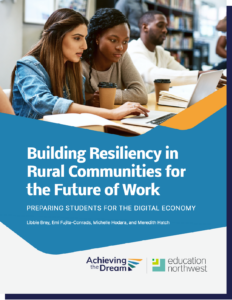Achieving the Dream sees community colleges as strong engines of economic mobility with a pivotal role to play in creating more economically vibrant communities. Implementing this vision requires institutions to use metrics aimed at strengthening student success and achieving long-term community success.
Colleges are seeing and understanding their local communities in new ways, improving access for populations that have been left behind by postsecondary education, and tracking the institutional metrics to ensure progress and success for all student groups — all of which can lead to helping communities flourish and thrive economically.
Rural-serving community colleges play a crucial role in the communities where they are located, being uniquely positioned to serve as regional hubs of economic development by providing the education and credentials needed in the local job market. Nationwide, about four in ten community colleges are rural-serving (444 out of 1,036 total colleges). One-third of ATD Network Colleges are rural-serving.
However, these institutions are often located in geographically isolated areas that are home to communities experiencing high poverty rates. As such, rural community colleges commonly face challenges around resources, student recruitment and enrollment, and employee retention.
These institutions must grapple with another struggle as well: Like rural, economically marginalized, and BIPOC communities throughout the nation, their student bodies have less access to affordable, reliable internet services, large-screen devices, and other technologies than do their non-rural, more affluent, white counterparts. Lack of access to technology results in fragmented technological knowledge and digital skills.
With all industries and nearly all jobs requiring at least foundational digital skills — including industries like agriculture that did not traditionally require tech savvy — and with higher pay going to positions requiring higher levels of digital skills, rural community colleges face a unique hurdle in preparing their students to make a livable wage in today’s economy.
Building rural resiliency
Rural-serving community colleges are advancing the economic mobility and health of their students, their families, and their communities. These institutions also make tremendous contributions to the ATD Network by working strategically to advance student success and sharing what they are learning with other Network colleges.
Confident that rural community colleges can address these equity gaps and prepare their students for well-paying jobs in the digital economy, in December 2020 Achieving the Dream launched the Building Resiliency in Rural Communities for the Future of Work initiative. With funding from Cognizant U.S. Foundation, JPMorgan Chase & Co., The Community Focus Fund at the Chicago Community Foundation, Walmart.org, and Ascendium Education Group, the project supported a cohort of seven rural colleges, selected in January of 2021, that worked over a three-year period toward four key goals:
- Preparing and connecting students to careers in the digital economy
- Identifying and closing equity gaps
- Developing and strengthening community partnerships
- Fostering a culture of evidence
In January of 2024, ATD was pleased to receive philanthropic funding from Margaret A. Cargill Philanthropies, enabling the momentum of the initiative to continue.
Lessons learned are outlined in a new briefing from Education Northwest, which partnered with ATD to conduct a participatory evaluation of the initiative. “Building Resiliency in Rural Communities for the Future of Work: Preparing Students for the Digital Economy” details the evaluation findings, with a specific focus on the initiative’s first goal: Preparing and connecting students to careers in the digital economy.
Community colleges and their partners can use this brief as a resource as they embark on efforts to improve students’ access to technology and the digital skills needed for jobs that pay family-sustaining wages or higher.
Building Resiliency in Rural Communities for the Future of Work
Preparing Students for the Digital Economy
To identify lessons learned through the Rural Resiliency Initiative, ATD partnered with Education Northwest to conduct a qualitative, participatory, and formative evaluation of the initiative.
Download the reportKey takeaways
The following are four key strategies identified as being helpful to rural community colleges as they plan and implement methods of supporting the development of their students’ digital skills:
- Align digital skills efforts with other initiatives to support shared understanding and sustainability. Many colleges in the cohort found it useful, for example, to add digital skills to the program/course review process.
- Assess students’ digital skills to understand and address fragmented knowledge and equity gaps in access to technology. Colleges identified knowledge and access gaps as a first step, including using an assessment tool, using virtual modules or small group workshops, hiring digital coaches, and including questions about digital skills on a yearly basic needs survey.
- Provide varied opportunities to acquire digital skills and focus on adaptability and problem-solving. Colleges adapted digital skills course materials for a variety of formats and platforms, including noncredit courses, microcredentials, for-credit courses, certificates, digital badges, and online programs — ideally in a skills validation form to boost motivation, self-confidence, and employability.
- Work with community partners to expand capacity to support digital skills. Colleges used ATD’s partnership analysis tool to develop or strengthen partnerships by engaging them in the program review process, in strategic planning for new pathways or programs, or in providing applied learning opportunities.
Rural Resiliency Cohort
Support and momentum
ATD’s strategies to support the Rural Resiliency cohort colleges included one-on-one support from two expert coaches, tools and resources including a partnership analysis tool and digital skills program review tool, and convenings and opportunities to engage in shared learning with other rural community colleges.
Reflecting on their work so far on increasing preparation for careers in the digital economy, an administrator at one Rural Resiliency cohort college said:
“One thing that our coaches did bring forward, because we had not really thought of that, was incorporating digital literacy in the things we were doing. Each time we would talk about strategies, they would ask, ‘Okay, how can you incorporate digital literacy into this?’. … During the process of us working with Achieving the Dream it’s become a primary focus at the college: How can we incorporate digital literacy within our courses and programs? And we’re thankful for that.”
Moving forward, ATD will continue to partner with rural community colleges. In June, the seven colleges in the Accelerating Equitable Outcomes cohort will launch their work with ATD at the Kickoff Institute in New Orleans. ATD and Education Northwest will continue to partner to identify and share key lessons learned from the Rural Resiliency cohort with the community college field.










